Amber Lehman
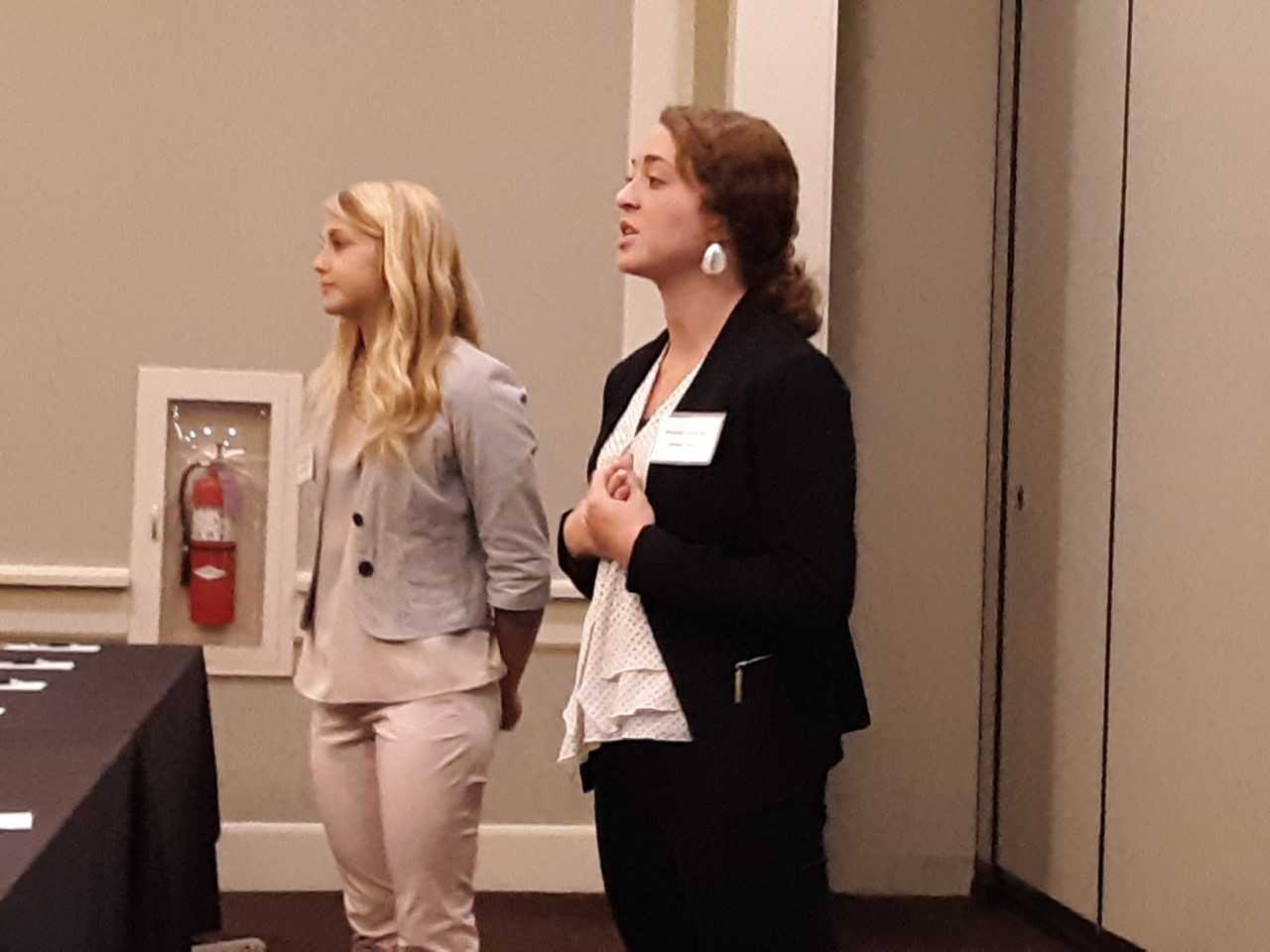 I was granted the opportunity to attend and present at the annual Pennsylvania Council for Exceptional Children Conference on October 5, 2018. Dr. Melinda Burchard approached me about this experience last spring and I immediately became excited about this opportunity to grow in my professionalism. Dr. Melinda Burchard and Kendra Bailey, a peer at Messiah College, co-presented with me on the title: “From Tier 3 to Special Education: Strategies to Increase Intensity of Interventions”. Our presentation focused on differentiating between interventions in the general education setting and in the realm of special education.
I was granted the opportunity to attend and present at the annual Pennsylvania Council for Exceptional Children Conference on October 5, 2018. Dr. Melinda Burchard approached me about this experience last spring and I immediately became excited about this opportunity to grow in my professionalism. Dr. Melinda Burchard and Kendra Bailey, a peer at Messiah College, co-presented with me on the title: “From Tier 3 to Special Education: Strategies to Increase Intensity of Interventions”. Our presentation focused on differentiating between interventions in the general education setting and in the realm of special education.
I learned more about the world of education and myself as an educator throughout this entire experience, from beginning to end. Initially, I grew in my understanding of special education and the role that it plays in the education system, from students with severe disabilities to the general education classroom. This helped improve my confidence in the realm of special education, where I was not previously as confident. I will take this knowledge of special education and the skills I have developed from it back into my own teaching experiences, as well as to my future classroom. Likewise, I will share my professional development and knowledge of special education on Messiah College’s campus, where I can collaborate with other future educators.
At the PACEC conference, I had the opportunity to meet and engage in conversation with other professionals from across the state. I met other future teachers, current teachers, as well as distinguished professors. During our presentation, Dr. Burchard, myself, and Kendra had the opportunity to hear about experiences from our audience. The group shared opinions and ideas, which helped expand the research from our presentation. We equally shared roles in presenting relevant information to our audience.
In addition to our own presentation, I also had the opportunity to attend other presentations and explore what else the conference had to offer. I learned more about behavior management in the classroom and discussed strategies with other educators and future teachers. It was helpful to hear ideas from others, who offered insight into alternatives I had not previously considered. This type of professional engagement is something I look forward to participating in again in the future.
Overall, this experience at the PA Council for Exceptional Children Conference granted me an irreplaceable opportunity to participate in the professional community. As a senior looking forward towards graduation, this experience was helpful to my preparation to participate in the world of education. Because of this experience, I now feel more prepared to be an active participant in the professional community of educators. I am also more confident in my ability to professionally share ideas and teach others what I know.
I would like to thank Dr. Dorothy J. Gish for her generosity in granting this award, as well as the committee for their dedication to expanding leadership on Messiah College’s campus. I am honored to be a recipient of this award and I look forward to sharing my experiences with others.
Emma Vogan
On Wednesday, October 17, Erin Cressman, Lily Gaudreau, and I arrived at the Biomedical Engineering Society (BMES) Annual Meeting. We registered and went to a reception to network with other professors and graduate students attending the conference. The next morning, I went to a seminar titled, “Marketing Yourself: Tips for a Successful Job Search” and another seminar on different drug delivery methods. The job search seminar was really helpful, since it was held by employees at companies who hire undergraduate and graduate students in industry. We spent the rest of the time before lunch walking around the career exposition hall. This was a huge area with all the top graduate schools, recruiters, and different industries. I learned a lot by doing this, because I had to go up to recruiters and market myself to them and learn about what industries and graduate programs look for in applicants.
In the afternoon, Erin and I went to 2 different seminars about biomedical engineering careers in industry. This session consisted of 4 panel members with different backgrounds answering frequently asked questions from students. These were probably the most helpful seminars, because it showed me what careers are available, and how to best reach my goals. They gave a lot of advice to people looking for jobs for the first time, and how to impress employers. They also taught us how to take initiative and be seen as a leader in your field. After these sessions, we went to a plenary session given by Dr. Anjelica Gonzalez from Yale about diversity and female engineers. She encouraged all of us to inspire young children and show them that they can do engineering too. She spoke about how to help the lack of diversity in engineering and how to retain more female engineers.
On the second day, we attended a session about how to get into graduate school, engineering solutions to health care disparities, and diagnostic technology for low-resource settings. In addition to these sessions, we spent all of our extra time networking in the exposition hall. This helped develop my professional social skills and gave me confidence even when talking to the professors in the biomedical engineering department at Johns Hopkins University. All around, this conference was extremely helpful in developing my skills as a leader, as a future candidate for graduate schools and industry, and as a student leader at Messiah College.
Rachel Steckbeck
On October 10, 2018, I was able to attend the SACNAS True Diversity in STEM conference to present a poster of my research and build my leadership skills. SACNAS, which stands for Society for the Advancement of Chicanos and Native Americans in Science, is a yearly conference that focuses on promoting diversity in STEM fields and gives space for underrepresented minorities to present their research and talk about their experiences. This year, the conference was headquartered in San Antonio, Texas.
This was the first scientific conference I had ever attended, so I did not know what to expect. I found it to be an invigorating environment, where I was surrounded by fellow students and scientists. During the conference, I attended several career-building sessions. One session I attended was called “Professional Networking.” Networking is a crucial skill for any leader to develop. It allows two professionals to connect and share information that can be beneficial for both people. During this session, we learned how to introduce ourselves to other scientists and how to follow up on that connection. I utilized these skills extensively when I attended at the Graduate School and Career Expo, where I conversed with several different graduate school recruiters and professors about their summer undergraduate research programs and M.D./Ph.D. programs. Another session I attended discussed how to excel at a graduate school interview. We went over several common questions we could be asked while at an interview, and how to answer these in a way that will let the interviewers know that we have the skills necessary to succeed.
At SACNAS, I was accepted to present a poster of my summer research with Dr. Silveyra, my lab mentor. The conference had two student poster sessions. During the sessions, students stand by their poster and other students, professionals, and mentors come around, listening to others’ research. Mentor judges also walked around, judging each student’s presentation and giving feedback to the student. My mentor judges were extremely helpful in honing my presentation skills, a crucial part of a leader’s skill set.
In addition to these experiences, I also heard several famous scientists speak. After a luncheon on Thursday afternoon, I listened to Dr. Ellen Ochoa speak. Dr. Ochoa was the Director of the NASA Johnson Space Center from 2013 to 2018. I was also able to hear presentations from Ed Yong, a science writer for the Atlantic, and Dr. Mica Estrada, a professor of social sciences at University of California San Francisco. These people were inspiring to me as an example of what I can aim for in my future career.
Altogether, this was an extremely important trip for me in developing my leadership skills and connecting with other scientists. I am so thankful to the Dr. Dorothy J. Gish Women in Leadership Award for allowing me to attend this conference!
Abby Pepitone
Earlier this year, I was invited by my Children’s Literature professor to help present at the Keystone State Literacy Association Conference on the topic of Visual Literacy Narratives. Using relevant information acquired through that course, I was able to apply my knowledge into a professional and educational setting. When reflecting on the conference as a whole, I believe that I strengthened skills in communication, public speaking, and professionalism as well as gained valuable information on topics in the field of education.
Considering my presentation, I felt that this Keystone State Literacy Association conference was a wonderful opportunity for me to connect to my major: Communication. The conference was decently small in overall size; therefore, two other presenters and I gave our speech to only three attendees. Despite the low number, I felt that this was the perfect atmosphere for rich discussion and questions with the audience. This overall had a positive effect on my overall confidence and performance throughout the presentation.
In addition to sharpening rich presentation skills, the Keystone State Literacy Association conference was a wonderful door into the professional world. I took extensive notes and learned valuable information through listening to various featured speakers and panelists speaking on a plethora of topics surrounding education. It was also a unique way to practice networking and speaking to people in various walks of life, specifically, ones who have been in the career field for a while. Above all, I was thrilled to attend the KSLA conference and I believe that the skills I acquired while away will carry with me through my time in college and into the work force.
Dakota Vaughn
With the help of the Dr. Dorothy J. Gish Women in Leadership Award, I had the privilege to attend the 2nd annual Leadercast Women event at a host site in my hometown, Hagerstown Maryland. The event featured seminars from nine incredible female leaders in all different vocational areas, sharing their leadership experiences and giving practical tips and encouragements about how to lead your team more effectively. The theme for this year’s event was “lead yourself” so there was a strong emphasis on how to improve your own efficiency and compassion as a leader in order to better lead others.
Between the seminars, there were opportunities to browse tables with information about various companies and organizations, both locally and farther away. One organization I found particularly interesting was Sass magazine, a women’s lifestyle magazine located in Frederick MD. As a student of journalism, this magazine piqued my interest as a potential place where I could put both my degree and my leadership skills to work after graduation. Networking with Sass was a unique opportunity I wouldn’t have been able to get had I not attended the event. I have since been in contact with the magazine and hope to continue the connection into the future.
The seminars themselves were also incredibly valuable. Hearing from speakers like Jess Ekstrom who started her own company while going to college, or Clemantine Wamariya who just published her memoir after years of living in refugee camps across a number of African countries made me feel not just inspired but also determined to make my impact as a leader in my community really count. The diverse representation of powerful women reassured me that I can make a difference as a team leader. I may not have a story quite as inspiring as some of the women who spoke at the event, but I have my own story to tell and my own team to lead, and plenty of wisdom to guide me from women who have come before.
Aside from the great seminars, there was also an opportunity for those in attendance to write a note of encouragement for young women leaders at the local Girls Inc. It was exciting to be able to take what I have learned as a leader at The Pulse, and what I learned from the women speakers at the event and write a message for a younger girl who’s also passionate about her community and leading others.
Overall, the Leadercast Women conference was a worthwhile experience that I feel has reenergized me as a leader of my team, and reminded me of my passion for leading in my community and working with others.
Kendra Bailey
This October, I had the opportunity to participate in the annual conference for the Pennsylvania Council for Exceptional Children. I co-presented with Dr. Melinda Burchard, Associate Professor of Special Education, and one of my peers, Amber Lehman. The topic we presented on was “From Tier Three to Special Education: Options to Increase Intervention Intensity”.
In this presentation, we highlighted past and present research on the topic. We consolidated two models for increasing intervention intensity, each of which had seven main points. Our presentation focused on a condensed model of nine ways to increase intervention intensity. This is what makes special education unique from the general education model of Multi-Tiered Systems of Support.
One of the ways that intervention intensity can be increased is through the use of evidence-based practices. These are practices that are research based and have been proven to work. Effect sizes are the measure for evidence-based practices, and all forms of research can be translated to effect sizes. The main accomplishment that I had personally through this presentation was the fact that I presented new research on effect sizes. This was one of the most challenging slides. I summarized past research, stating the standards for small, moderate, and large effect sizes. I also presented the changes that had been made to that research several years ago. The newest research dramatically changes the standards for effect sizes, making many more practices able to be considered effective with learners in the special education setting. This was one of the focuses of our presentation. Accompanying these findings were other options to increase intensity such as group size, individualized learning through IEPs, self-regulation strategies, attention to transfer, and more.
This conference was a great opportunity for me. I am now more confident in my ability to present in front of other professionals and to attend future conferences independently. I am thankful for this opportunity given to me by Dr. Melinda Burchard.
Erin Cressman
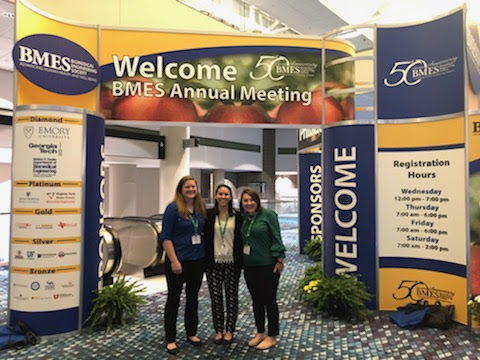
Partially due to the funding of the Dr. Dorothy J. Gish Women in Leadership Award, I attended the Biomedical Engineering Society Annual Meeting in Atlanta, GA from October 17th – 19th with two classmates. Attending the conference was extremely beneficial to me professionally as I was able to accomplish many of my professional goals while attending. During the conference, I was able to introduce myself to professors and admissions departments of graduate schools I am interested in applying to. This allowed me to network with them and get advice about applying to their program, while also hearing about their respective school’s research opportunities. Having the opportunity to meet with the professors in person created an opportunity for me to demonstrate my communicative abilities and answer my questions about the various schools. This conference also gave me the opportunity to connect with schools that would be challenging to visit due to their location. There were also various companies there who I was able to network with. They were more than willing to answer questions I had about a career in industry and provided me with contact information if I was interested in learning more about their companies. The members of BMES were all extremely willing to network and share their knowledge with others, and it was a great atmosphere to learn and grow in my networking skills as well as professionally. Some of these attendees were graduate students there to present about their current research, who were all very willing to network and help me in my graduate school search.
This conference greatly helped me to be a better professional by marketing myself. Learning how to do this effectively is the key to creating the best networks and opportunities in the future, and by attending this conference, I was able to learn how to demonstrate those skills in my networking. Flying to a new city and walking into the convention center where there were thousands of engineers was intimidating and challenging, but the conference showed me the importance of community within a career field and how together all the members of BMES are working towards leading society to be a better place. Understanding how I will fit into this was an important accomplishment for me as I prepare to graduate in the spring.
A final accomplishment of this conference is my ability to share with fellow classmates. This gives me the responsibility of being a leader and serving my fellow classmates through sharing my experiences with them and passing on advice and connection attained from the conference. I have had some great conversations already and hope to continue to have opportunities to share. I strongly recommend other students interested in the Biomedical Engineering field to attend this conference. It was an amazing opportunity and I am thankful to the members of the Dr. Dorothy J. Gish Women in Leadership Award committee for their support and funding.
Hannah Wagner
The National Council on Family Relations Conference was by far the most professional event that I have ever attended. I learned a great number of things while attending, and even though I was most likely one of the youngest people there, I appreciated the new crowd of people that were interested in the same field as me.
In general, the conference helped me to learn independence in a new way. It was held in a city that I have never been to before, and I traveled with peers. This gave me a chance to explore, get to know people that share my interests, and be an independent learner, which is a wonderful experience to have.
While presenting my poster with Hannah, multiple attendees approached us and asked about our personal experiences with the project. We were able to intellectually discuss the importance of our project with professionals, professors, and other students who related to our experiences and wanted more information. One of my professors told me how proud he was that Hannah and I pursued presenting at the conference even though we are very young; this was an encouragement to me as a student and as someone who will one day be a professional in the field as well.
As for the sessions that I attended, I focused on ones that were about immigration, adoption, individuals of mixed status, and refugees, as these are the topics that currently interest me the most. In these sessions, I learned about new terminology used to discuss the topics, such as “hyphened Americans”, and I was made aware of the process and outcomes of research studies currently being conducted. Observing these research presentations up close was a unique way to learn about what is being studied in the field today. One of the things that I love most about the HDFS major is that there is always new information to learn and study! This conference gave me a newfound excitement for learning about new topics because I was able to witness the people doing the research and learning new things firsthand.
The conference was a phenomenal experience, and I would love to attend again. Even though I am still young, I learned so much, and as I get older and discover my passions more in depth, I will be able to glean more from future conferences.
Allison Reed
Being a presenter at the KSLA conference and participating in the various workshops, events, and award ceremonies was an experience that enhanced my perspective on literacy in the classroom. As a developing professional who is constantly seeking best practices to incorporate into my future elementary classroom, I feel that these types of professional development opportunities are crucial and should be highly encouraged for those of us going into the wonderful field of teaching.
The topic of our presentation was, “The Implementation of Interventions and Enrichments in Pre-Service Teaching Curricula”. The goal of this presentation was to educate higher-ed. professionals on the importance of exposing pre-service teachers to the word of data-driven decision making, and to encourage these professionals to implement this requirement into their own teacher education programs. As a pre-service teacher who went through this curriculum first-hand, my primary role in this workshop was to share my experience with the enrichment portion, which I planned and implemented during my junior field experience in the spring semester.
Along with presenting this research, I had many opportunities to speak with experienced professionals from diverse specialties, including reading specialists, literacy interventionists, authors, and book illustrators. The many conversations I had with these professionals concerning literacy in the classroom gave me the opportunity to view literacy with fresh eyes, and I went back to my classroom the next day re-inspired and ready to implement the great ideas I had gathered.
I will never forget the new perspectives I gained from participating in this conference, and I am so grateful for the generosity of the Dr. Dorothy J. Gish Women in Leadership Award that made my attendance possible.
Xin-Dee Low
On November 14th, I attended the Machine Learning Conference in San Francisco. Despite all the travel conflicts—flight delays and bad weather conditions, I enjoyed the experience and I can say that I learned a great deal.
At the conference, big companies such as, Facebook, Google, Walmart, Amazon, Baidu, as well as smaller start-ups like, Polarr, Medium, One Concern and many others were present. Most of the people who attended the conference were from tech companies, banks and big universities, such as, Microsoft, Wells Fargo, UC Berkeley and University of San Francisco.
I came to this conference with minimal knowledge on Machine Learning. I knew the basic terms such as, Artificial Intelligence and algorithm, but I had no clue on how to build them, let alone improve them. Thus, sitting among the pool of experts within this field, I felt intimidated and very out of place. Then, Forough Poursabzi-Sangdeh, a researcher at Microsoft Research, presented the topic, “Manipulating and Measuring Model Interpretability.” She explained the ways insufficient data gave programmers the opportunities to manipulate the data to fit their pre-determined outcomes. Her presentation jerked me back to reality; it reminded me of the reason I came to this conference. It was my passion on the social justice aspects within machine learning that brought me here and I saw this conference as a great opportunity to learn about the current situation within the field.
During one of the coffee breaks, I got a chance to talk to Jimmy, one of the developer from Medium. He asked what my interest was, and I replied, “The social justice side of machine learning. Big corporation nowadays are focusing too much on profits and jeopardizing human rights in return.” He looked at me, with his eyes slightly widened and replied, “Then you are at the wrong place. All the people here are about making profits for big corporations.” I was more shocked that he blatantly pointed it out than about the fact itself. He went on sharing his point of view on the issue—which was neither shared by his colleagues nor company. Although he agree that there are injustices within the tech industry, he believes it could only be achieved through political legislations. After our hour long conversation, I felt that his moral integrity was triggered in some ways, for he stated, “there’s lots for me to think about regarding my long-term career path.” His statement gave me hope.
I have concluded that more work needed to be done in addressing social injustices within the tech industry. Out of the sixteen presentations at the conference, only Forough’s presentation emphasized the importance of interdisciplinary work between Machine Learning and Humanitarian works. I believe there are more people like Jimmy within the tech industry that are troubled by the injustices that is happening but are unsure on what to do. This experience encouraged me to work harder in bringing a humanistic lens into the tech industry.
Kayla Flemmens
On December 1, 2018, I was privileged to attend the STEM Virtual Conference entitled “Embracing STEM”. It was produced by National Science Teachers Association (NSTA) and it was a great opportunity to gain practical ways to implement STEM education into my future classroom. As a middle-level math and science education major, it is almost a guarantee that I will need to incorporate different STEM activities and strategies into my classroom. This conference got me excited about the different potentials there are through STEM education and helped me understand its purpose and value.
There are many reasons why STEM education is important, and it extends beyond just the content of each discipline. While STEM education helps prepare students for careers that are centered around STEM, as employment in these fields is at an all-time high, it more importantly helps prepare students to participate in democracy by giving them logical and systematic thinking abilities and skills. STEM education also engages students because it connects their learning to the real-world and helps provide an equal education for all students. STEM extends beyond content by using students’ knowledge, attitudes, and skills to identify and respond to questions and problems of real-life situations.
There are many things that I learned through this conference that will help me better teach in my future classroom. I now better understand how to actually implement STEM education into my classroom, despite the many barriers that teachers face when they try to do so. I also learned how to incorporate different community resources and how doing this improves student learning.
This conference also gave me several new ideas for leading my Collab team, Harrisburg Science Camps. Because of this conference, I can now better articulate why STEM education is important to my team, and together we can brainstorm ways to incorporate the different methods of STEM into our science lessons at Downey Elementary School. Because of this conference, I have ideas of how to better connect the students’ learning to different real-world situations in order to make it more applicable and engaging. Doing this will foster critical thinking, which is a difficult but important skill for students to develop. I also appreciated the different ideas presented regarding project-based learning and am looking forward to brainstorming these ideas with my team to help our students become better problem-solvers and to promote scientific inquiry. Giving students more freedom to create their own problems and discover solutions promotes ownership and citizen science. When these students, who are often overlooked, can realize that STEM is for everyone and that there are multiple correct answers to the same problem, the most important type of learning will take place. I am excited to see how incorporating the different ideas and strategies I learned from this conference will impact the students’ views of themselves as scientists.
Rebekah Forshey
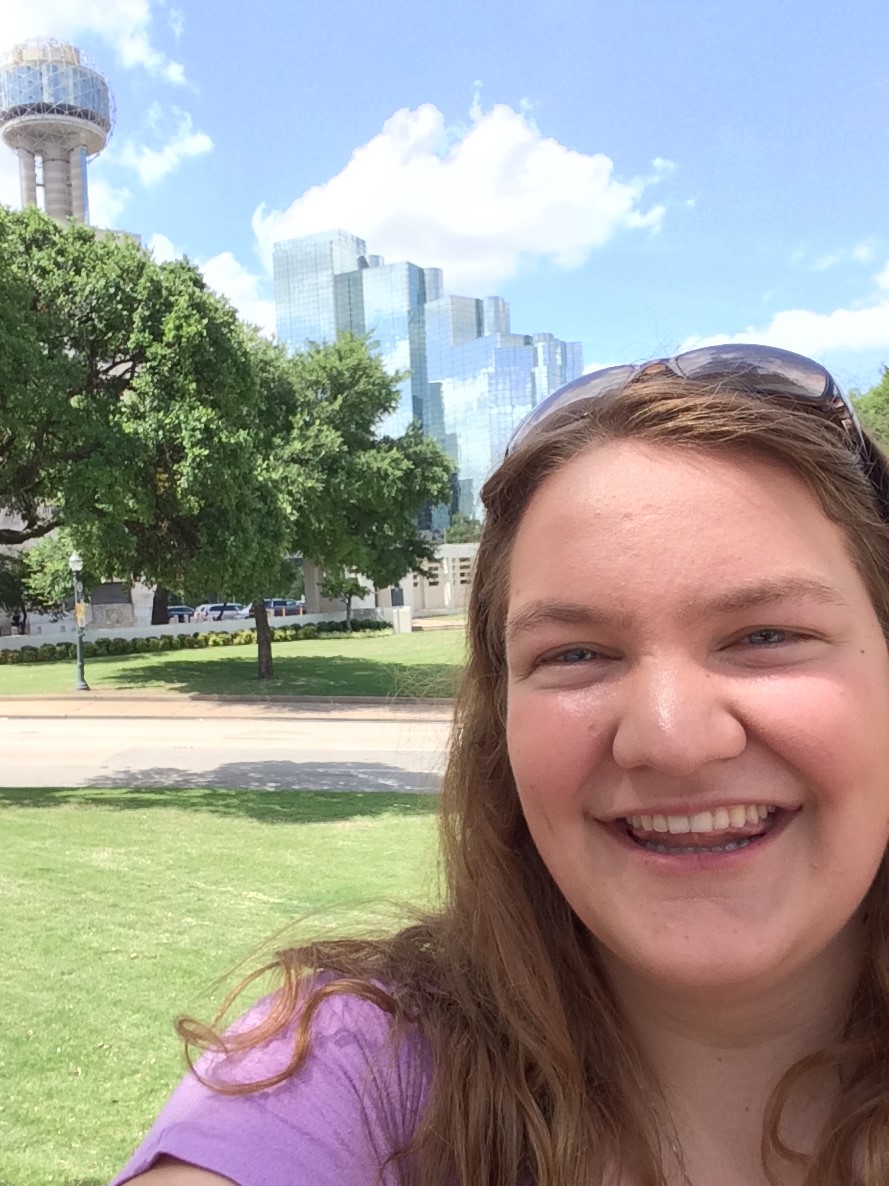
Because of the Dorothy J. Gish Leadership Award, I had the opportunity to attend the New Jersey American Academy of Orthotics and Prosthetics (NJAAOP) Conference in Atlantic City, New Jersey on Thursday, November 8th. Throughout the day, I had the opportunity to listen to a variety of seminars taught by leaders in the field. The topics that I found the most interesting were about the relationship between bones and sockets, 3D printing in the field, and osseointegration. During the first seminar break, I talked to some graduate students at the University of Hartford about their experience in the MSPO program and the research they were working on. I found it interesting, especially with my project work in the Collaboratory, how their research teams were designed and structured. For the lunch hour, I sat with one of the staff members of the conference, who happens to make orthotic braces for the New York Giants football team. Since the 3D printing session was right after lunch, we were able to have a good conversation about his work with trying to 3D print the braces to save travel time for the team, and I was able to share with him the insight that I have learned about 3D printing clubfoot braces for my Collaboratory project.
I also met an older woman who is an orthotic fitter at a large orthotics company in Philadelphia. She was such a blessing to me throughout the day, and she helped introduce me to different company representatives. There was a whole room full of exhibitors sharing different products, and together, we were able to visit every stand and gather information through brochures and business cards about those businesses. She encouraged me to put together a binder of all the information that I collected throughout the course of the day. When I started to organize it, I had no idea how much information and contacts I collected throughout the day that I know will benefit me in the future. This lady, whose name was Jessica, also has experience working with the head of the graduate school that I want to attend in Houston, Texas. This was one of my first networking opportunities, and it was so exciting to learn how many people know other people in the field. And as I was one of the only students there, everyone was very friendly and willing to teach me about their companies and positions. Of all the things that I learned throughout this experience, it is how important starting conversations and collecting information is. Because had I not done that, I would not have made anyone new connections. I am very thankful for the opportunity I had to attend this conference and the people I met there.
Rebecca Hegman
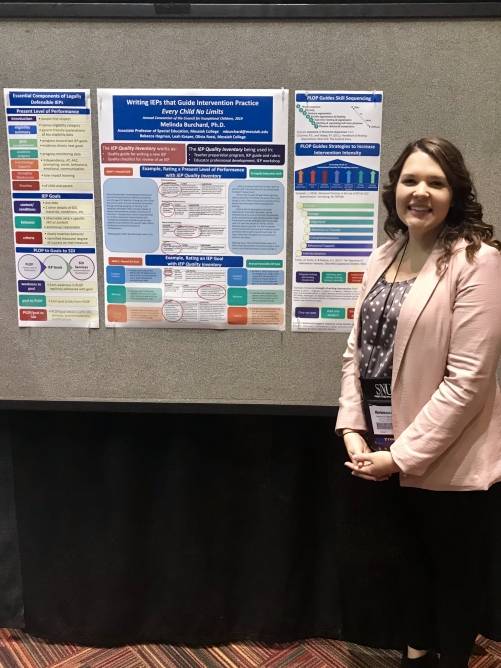
I had the amazing opportunity to travel to Indianapolis, Indiana to participate in the Council for Exceptional Children 2019 Conference and Expo. This truly was a once in a lifetime opportunity as most undergraduate students do not get to present at this conference. During the first few days of the conference I was able to hear from many famous researchers in the field of Special Education. Then, on Friday I was able to co-present with Melinda Burchard and two of my peers. I was able to talk to conference attendees from all over the United States and a professor from Japan. Our poster presentation was interactive and gave me the opportunity to connect with and network with professionals in the field of Special Education. The contacts that I made at this conference have led to the possibility of future employment and graduate school opportunities. Without this award, going to this conference would not have been possible. I am excited to be able to use what I have learned at the conference in my courses this semester and to be able to share my new found knowledge with my peers.
Leah Kasper
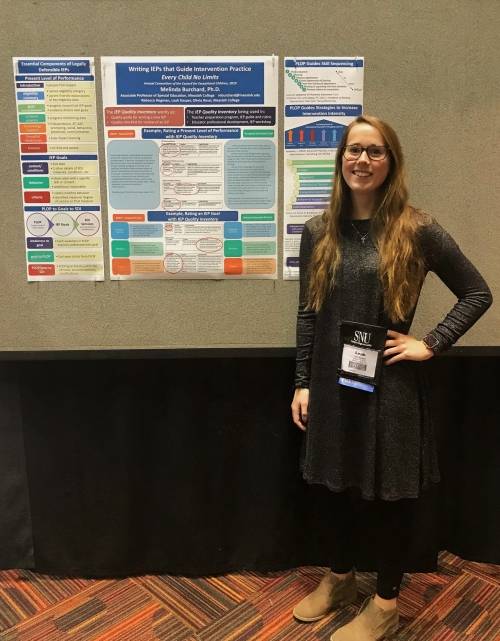
This past week I attended the Council for Exceptional Children Convention and Expo. I was able to attend different sessions for professional development over the course of four days. I then was able to present with my professor and two of my classmates. It was an extremely enriching experience.
I had an hour-long presentation where I got to talk about writing quality Individualized Education Programs (IEPs) that follow intervention practices. I shared how preservice and in-service teachers can use our quality inventory tool to help write or revise their IEPs. I went through how to use the tool step by step as well as showed how it can improve an already flawed IEP.
Presenting for all the different teachers, special education administrators, principals, and more was an awesome opportunity. Everyone was intrigued in our work and they all wanted the tool for themselves; they wanted to use it and share it with their collogues and friends. We had schools telling us to apply to teach there and we also had colleges trying to recruit us to get our masters there.
In addition to presenting, I was also able to gain a lot of helpful knowledge from the different sessions I attended throughout the convention. My favorite session was on the Endrew F v. Douglas County Schools and how this case effects special education. This case was huge! It finally said that children need to show progress that is appropriate in light of his or her circumstances. Students can no longer just make merely de minimus progress, there needs to be more of an educational benefit. At other sessions I learned how to reduce restraint and seclusion, more about student engagement, how to incorporate High Leverage Practices(HLPs), how to properly co-teach, strategies and resources on reading comprehension, and promoting social-emotional competence.
All of the experiences and knowledge I have gained during the four days at the CEC convention, I will keep with me and use throughout my career. I am excited to use this experience to benefit myself and my future students. Thank you for allowing me to have this opportunity, your generosity is greatly appreciated!
Olivia Rossi
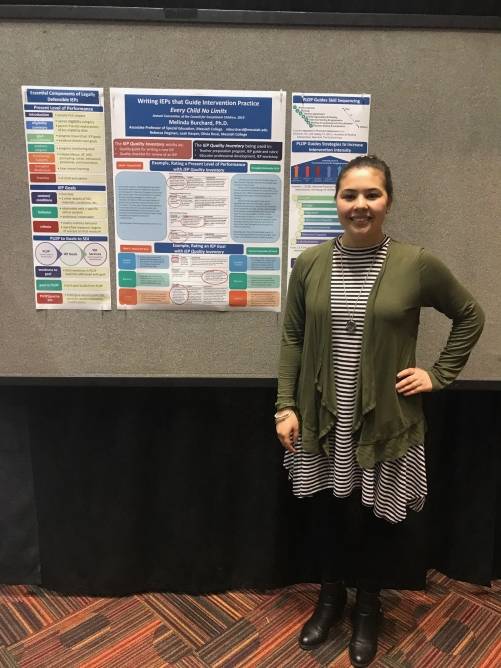
As a special educator, it is crucial to develop clear and easily applicable Individualized Education Plan (IEP) goals for the classroom. Teachers who are writing these goals need to make sure that they are measurable, attainable, and applicable to the students particular needs. At the CEC convention I had the opportunity to co-present at a poster session during the conference. Our poster presentation allowed participants to review quality standards established by various studies and guidelines. Then using a rating grid, we worked with participants to critique and improve sample IEP goals for the quality of each component. Through this poster project, I was able to encourage teachers and related-service providers in their personal preparation as well as in public policy.
